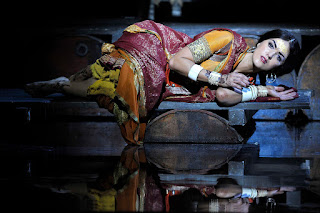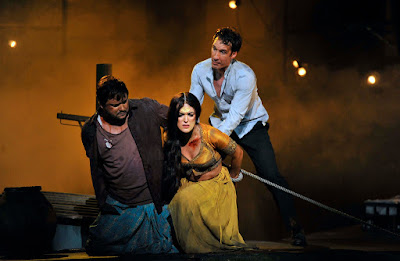 |
| English National Opera - The Pearl Fishers - (c) Robbie Jack |
Reviewed by Robert Hugill on Oct 19 2016
Star rating:
Not quite a vintage revival, but much to enjoy in this spectacular & stylish show
 |
| Jacques Imbrailo - (c) Robbie Jack |
The Pearl Fishers is an early work (Bizet's first full length opera) with a profound faulty libretto which a more experience composer would have surely done something to remedy. After Bizet's death attempts were made to correct and improve the work, but often these resulted in the removal of Bizet's more innovative details. ENO uses an edition by Martin Fitzpatrick which attempts to go back to Bizet's original intentions, and was performed in Fitzpatrick's own translation.
 |
| Claudia Boyle - (c) Robbie Jack |
All three of the principals seemed to take a little time to warm-up and you felt that the production was not quite bedded in, and that it will settle admirably as the run progresses. A perennial gripe when performing 19th French opera nowadays is the problem of style, and here the cast seem to have been very much left on their own. Roland Böer conducted a sympathetic, if perhaps four-square, account of the score but I thought that principals could have done with helping more in a unified approach to Bizet's music. It is after all an early work and heavily indebted to predecessors like Fromental Halevy (also his father-in-law), so inculcating a sense of style would have been helpful. As it was the three seemed to each go their own way, providing different approaches to Bizet's music.
 |
| Jacques Imbrailo, Robert McPherson - (c) Robbie Jack |
I last heard Robert McPherson as Percy in Welsh National Opera's production of Donizetti's Anna Bolena (see my review) and his voice still has the same interesting combination of narrow focus and forward brilliant tone. It is a very distinctive voice, but one which makes a great deal of sense in this repertoire, giving us a sound something closer to the pre-War style of performance. It was a shame that is big aria was in Act One, because he really only seemed to get into his vocal stride in the second act. But his combination of lyric flexibility with extensive use of head voice was rather notable and greatly daring. Whilst there was the odd wobble at the very top, it was lovely to hear a tenor performing with something approaching the correct vocal style for the music.
 |
| Robert McPherson, Claudia Boyle, Jacques Imbrailo (c) Robbie Jack |
The role the high priest Nourabad is not particularly big or rewarding, but James Creswell performed nobly and used his resonant voice to great effect. Almost a a star in its own right, the chorus were on thrilling form and thanks to Bird's tiered set we were able to see and hear them in a way which is not always possible.
Whilst I commend and appreciate the use of Bizet's original, there is no doubting that the final scene is rather under written. Musically Bizet contributes little as memorable as the burning of the village which the designers conjured up. Martin Fizpatrick's admirably straightforward English translation rather brought out the prosaic nature of the libretto, and you could not help feeling that singing it in French, or rather more poetic English might have been an improvement.
But the real star of the show remains the production, with its thrilling designs and wonderful images of the pearl divers going about their business. For all Penny Woolcock's desire to introduce an element of realism, this is a brilliantly theatrical show.
Elsewhere on this blog:
- Elegance and economy: English Touring Opera in Monterdi's Il ritorno d'Ulisse in patria - opera review
- Transcendent dance: Messiaen's Quartet for the End of Time - concert review
- Baltic Wagner: Kristjan Järvi and the Baltic Sea Philharmonic - CD review
- Mix of old and new: David Hansen and Brodsky Quartet at Kings Place - concert review
- Sung poetry: Christian Gerhaher and Gerold Huber in Schumann and Dvorak at the Wigmore Hall - concert review
- Cross-cultural friendship: Jean-Guihen Queyras Thrace: Sunday Morning Sessions - CD review
- Delightful evening with a dark backdrop Handel's Xerxes from ETO - Opera review
- Liszt for the 20th century: Kenneth Hamilton plays Ronald Stevenson - CD review
- Interest and disappointment: Holst Singers in RVW - concert review
- Songs of the big smoke: Song in the City's Voices of London - Cd review
- A feast of pianism: Two-piano gala at the London Piano Festival - concert review
- Home











No comments:
Post a Comment